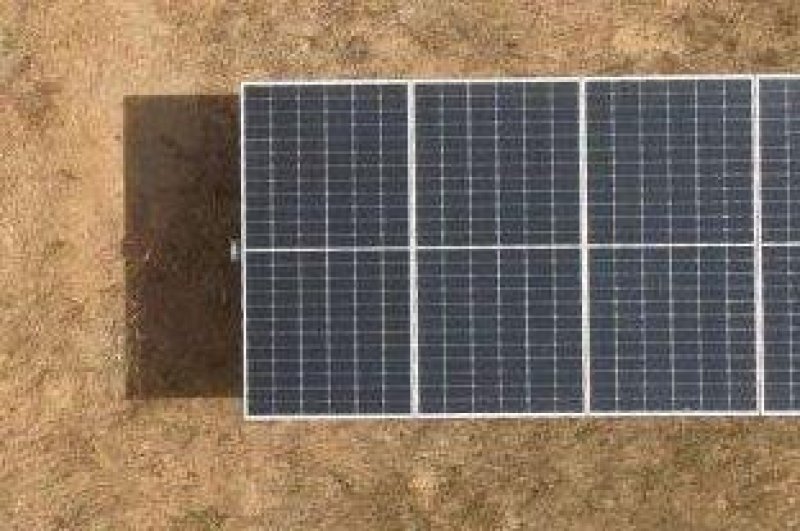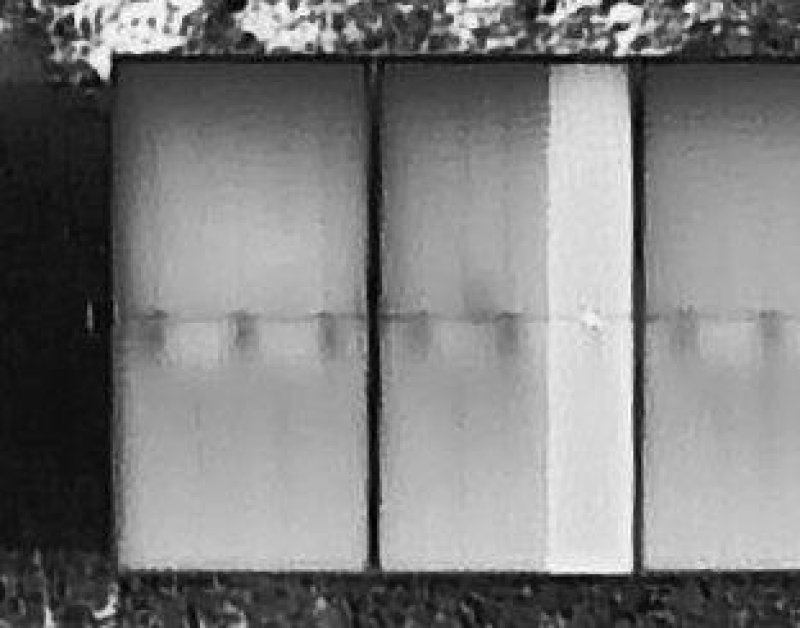
Drone inspection of photovoltaic power plants: A solution for the energy transition in Burkina Faso
Burkina Faso Flying Labs and Flying Labs Namibia combined their knowledge and skills to successfully execute a solar panel inspection in Burkina Faso.
May 12th, 2025
By Burkina Faso Flying Labs and Namibia Flying Labs
In the world of drone technology, applications are only limited by our expertise and imagination. This blog post highlights a collaborative project between Burkina Faso Flying Labs (BFFL) and Flying Labs Namibia (FLN), where our teams combined their knowledge and skills to successfully execute a solar panel inspection in Burkina Faso.
As the Burkinabe government continues its ambitious energy transition—expanding community access to energy while reducing reliance on external supplies—solar power has played a key role. In 2023, renewable energies accounted for 21.93% of national energy production, a significant rise from just 9% in 2015, thanks to the commissioning of multiple photovoltaic power plants. Ensuring these solar installations remain efficient and well-maintained is critical to sustaining this progress.
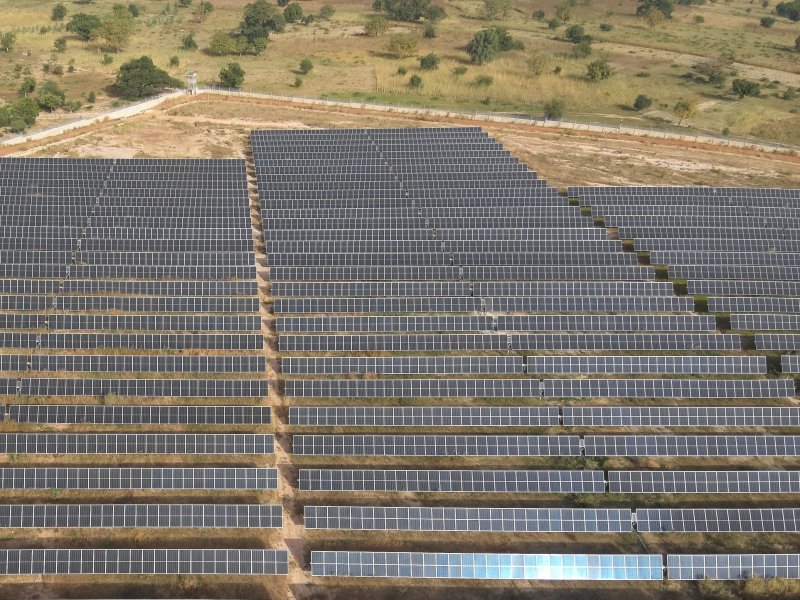
Establishing effective maintenance strategies is a major challenge for the solar industry. In its annual report of the solar industry's performance, RAPTOR MAPS estimates that economic losses due to equipment failure average almost $4,500/megawatt per year. In a fragile national economic context, these findings highlight the need to equip Operations and Maintenance (O&M) teams with the operational means to effectively assess equipment conditions. To tackle this challenge, Burkina Faso Flying Labs (BFFL), with technical support from Flying Labs Namibia (FLN), implemented a pilot project for thermographic drone inspection of a 20 MWp photovoltaic power plant. The main objective of this pilot project is to develop an innovative, effective, comprehensive, low-demand, financially accessible and scalable inspection method.
Technical phase of data collection and analysis
Equipped with a thermal sensor, the inspection drone DJI Matrice 30T was deployed over the site, to collect thermal images that will enable the temperature distribution on the surface of the photovoltaic modules to be recorded.

On return from the field, analysis of the thermal signatures using specialized DJI and ESRI software revealed a number of anomalies: modules in open circuit (i.e. producing no energy), damaged bypass diodes, and major fire hazards. The corrective actions taken on the basis of the inspection report's recommendations, prioritized according to severity level, will have prevented major safety risks and corrected a significant drop in energy production. A breath of fresh air for some 200,000 households supplied by the plant!
The images below show the thermal signature analysis.
The Glocalization Model at work
This pilot project, the result of a transfer of skills from East to West Africa, followed by a specific technical adaptation to the Burkinabe context, is a good illustration of Glocalization, a key concept at the heart of the Flying Labs Network model.
Indeed, we had to refine the analysis methodology so as to be able to interpret the thermal signatures observed and precisely identify the roots of the defects detected by the inspection. Burkina Faso Flying Labs is thus taking the first step towards creating local expertise in photovoltaic power plant inspection for sustainable investments and a more resilient community.
With this strengthened collaboration, our new multinational team is now well-positioned to take on more inspection projects. We encourage industry stakeholders to reach out to us for their solar panel inspection needs—we are ready to support your efforts in maintaining and optimizing renewable energy infrastructure.
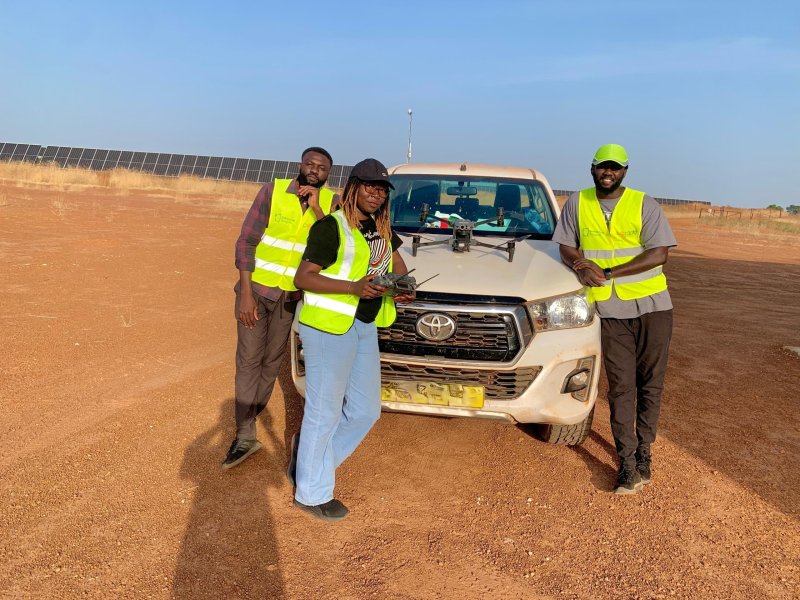
______________________________________________________________________________
Inspection par drone de centrale photovoltaïque : Une solution innovante au service de la transition énergétique au Burkina Faso
La technologie des drones ouvre un champ infini de possibilités, limité seulement par notre expertise et notre imagination. Dans ce billet, nous revenons sur une collaboration inspirante entre Burkina Faso Flying Labs (BFFL) et Flying Labs Namibia (FLN), où nos équipes ont uni leurs forces pour inspecter un site solaire au Burkina Faso.
Dans un contexte de transition énergétique ambitieuse, le Burkina Faso mise fortement sur le solaire pour renforcer l'accès à l’électricité et réduire sa dépendance aux énergies importées. Grâce à la mise en service de plusieurs centrales photovoltaïques, la part des énergies renouvelables dans la production nationale est passée de 9 % en 2015 à 21,93 % en 2023. Une évolution majeure, qu’il convient d’accompagner en assurant le bon fonctionnement et la durabilité de ces installations.

L’efficacité de la stratégie de maintenance constitue un défi majeur de l’industrie solaire. Dans son bilan annuel des performances de l’industrie solaire, RAPTOR MAPS évalue les pertes économiques dues à la défaillance des équipements à près de 4500 dollars/Mégawatt par an en moyenne. Dans un contexte économique national fragile, ces constats relèvent le besoin de doter les équipes d’Opération et Maintenance (O&M) des moyens opérationnels d’évaluer efficacement les conditions des équipements. C’est à cet effet que le Burkina Faso Flying Labs (BFFL) avec l’appui technique du Namibie Flying Labs (NFL) ont mis en œuvre un projet pilote d’inspection thermographique par drone d’une centrale photovoltaïque d’environ 20 MWc. L’objectif principal de ce projet pilote est de développer une méthode d’inspection innovante, efficace, compréhensive, peu exigeante, financièrement accessible et évolutive.
Phase technique de collecte et d’analyse de données
C’est équipé d’un capteur thermique que le drone d’inspection (DJI Matrice 30T) a été déployée au-dessus du site, afin de collecter des images thermiques qui permettront de capter la distribution des températures à la surface des modules photovoltaïques.

De retour du terrain, l’analyse des signatures thermiques à partir de logiciel spécialisé de chez DJI et ESRI a permis de détecter diverses anomalies : Modules en circuit ouvert donc ne produisant pas d’énergie, des diodes de dérivation endommagées ou encore des risques majeurs d’incendie. Les actions correctives prises sur la base des recommandations du rapport d’inspection, hiérarchisées suivant le niveau de sévérité, auront permis de prévenir des risques de sécurité majeurs et de corriger une baisse importante de la production d’énergie.
Les images ci-dessous montrent l'analyse de la signature thermique.
Concept de Glocalisation du Réseau des Flying Labs
Ce projet pilote, fruit d’un transfert de compétence de l’Afrique de l’Est vers celle de l’Ouest, suivi d’une adaptation technique spécifique au contexte Burkinabé, illustre bien la Glocalisation, ce concept clé au cœur du modèle du Flying Labs Network.
En effet, le BFFL a dû affiner la méthodologie d’analyse, de sorte à pouvoir interpréter les signatures thermiques observées et précisément identifier l’origine des défauts relevées par l’inspection. Le Burkina Faso Flying Labs impulse ainsi le premier pas vers la création d’une expertise locale en matière d’inspection de centrale photovoltaïque, pour des investissements pérennes, pour une communauté plus résiliente.
Cette synergie entre nos équipes renforce notre capacité à répondre aux besoins croissants en inspection de sites solaires. Nous invitons les professionnels du secteur à nous solliciter : nous mettons notre expertise au service de la performance et de la durabilité des infrastructures d’énergie renouvelable

Category(s)
Location(s)
Recent Articles
View All »
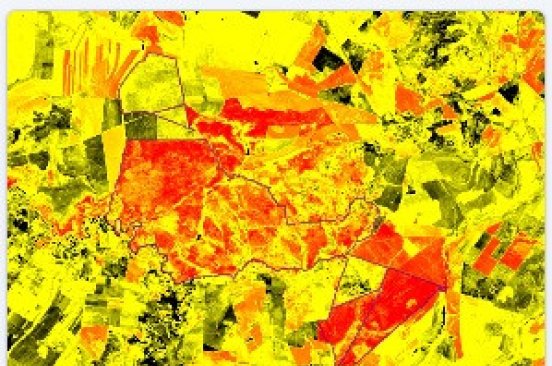
Wildfire Assessment and Web Application in Sao Paulo

